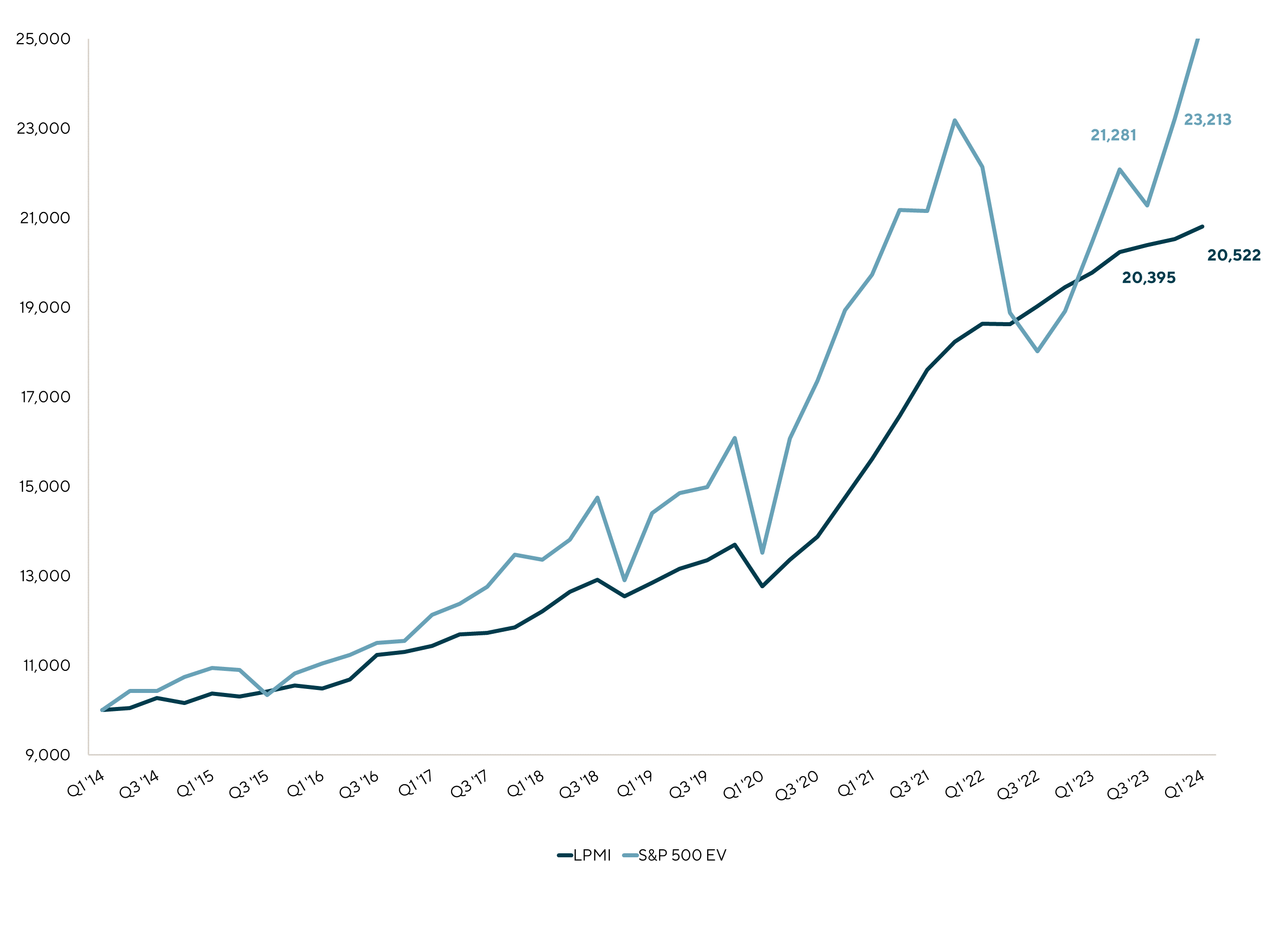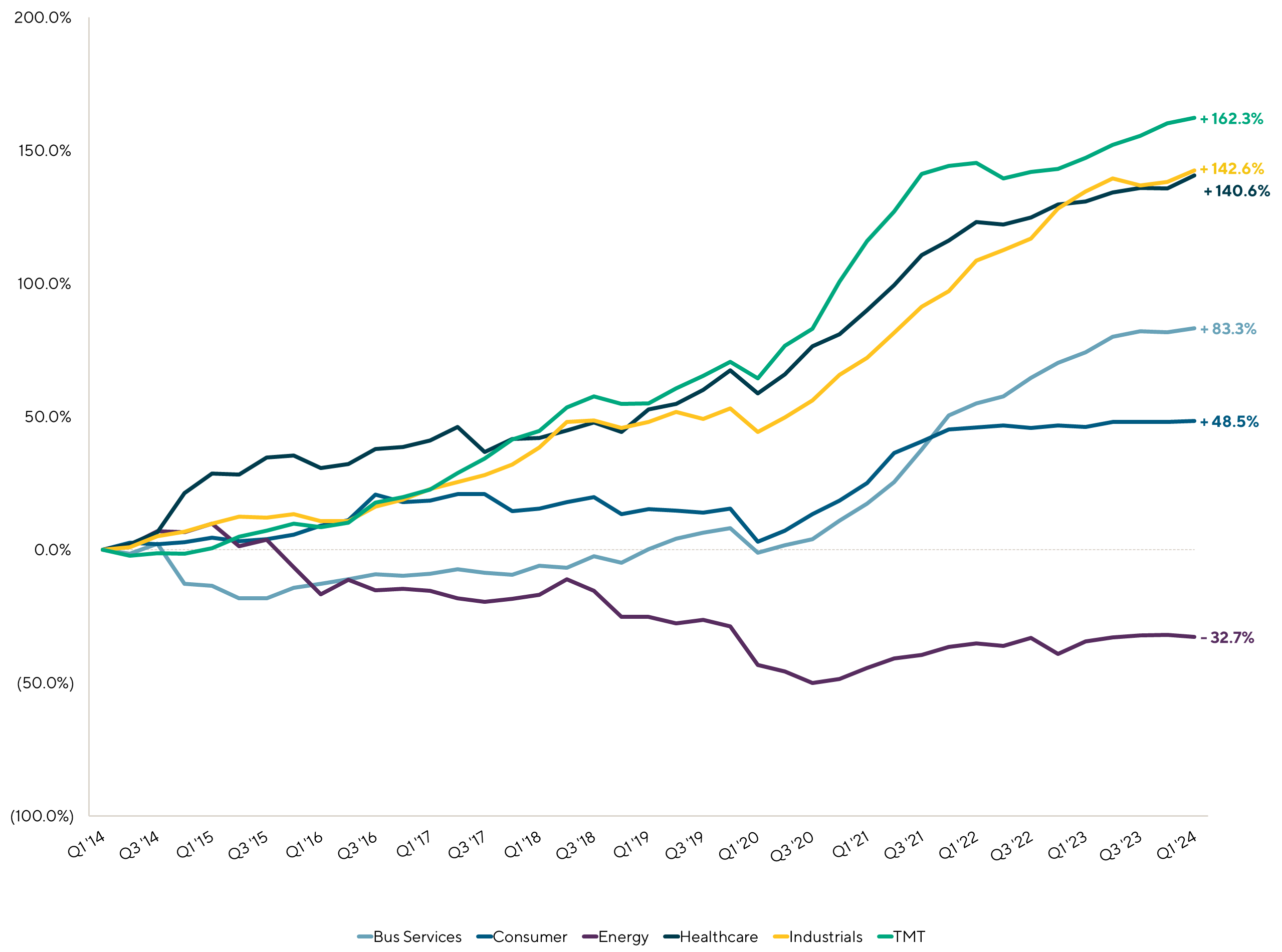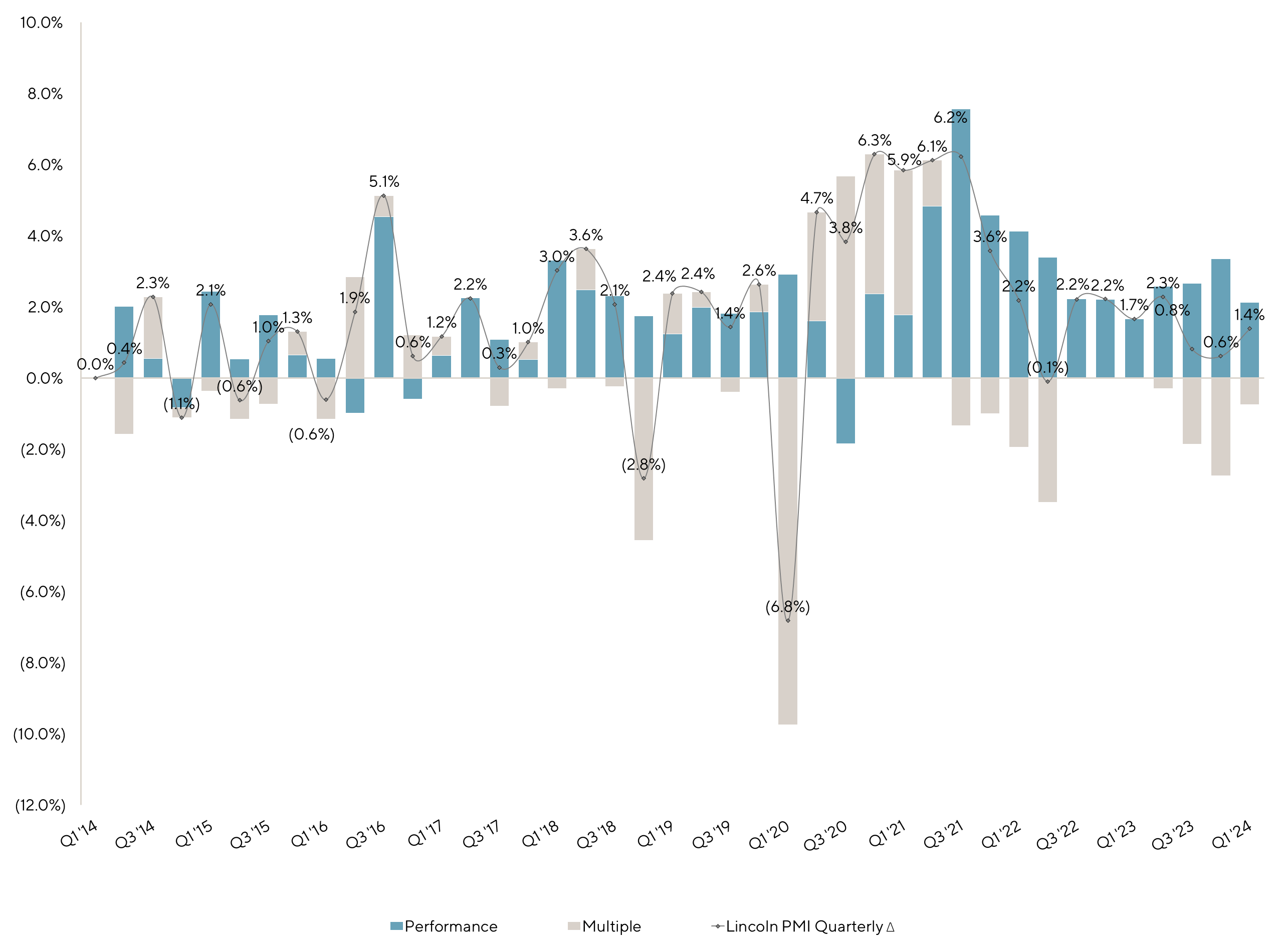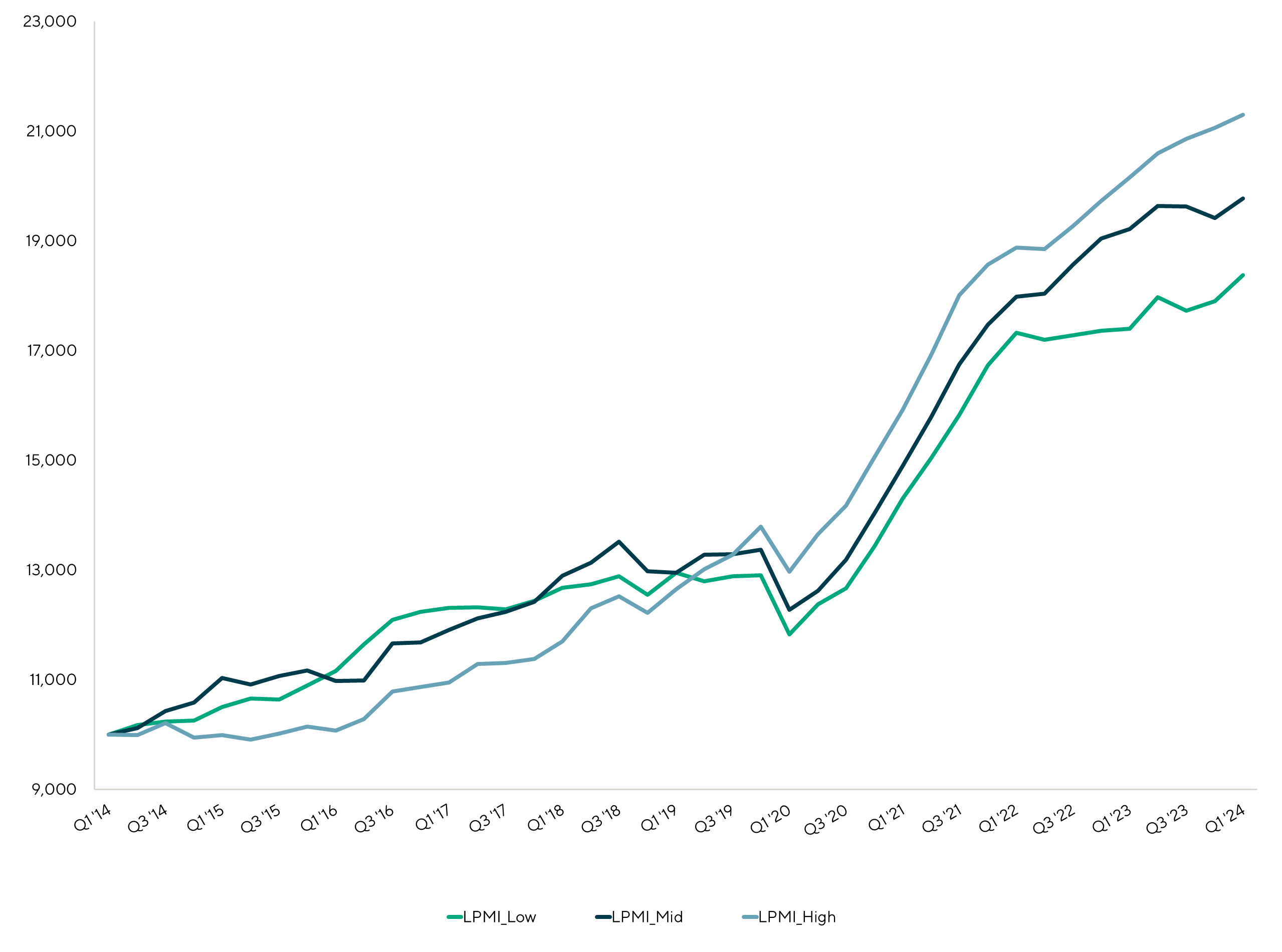Q1 2024 Lincoln Private Market Index
Lincoln Private Market Index Continued to Climb in the First Quarter on the Back of Steady Earnings GrowthThe Lincoln Private Market Index (LPMI), the only index that tracks changes in the enterprise value (EV) of U.S. privately held companies, increased by 1.4% during the first quarter of 2024, as the index climbed to yet another record high. The LPMI’s increase was less than that of the S&P 500, which increased 9.2% in Q1 2024 largely a result of multiple expansion. The increase in the LPMI was due to persistent earnings growth amidst a fairly stable valuation multiple environment in the private markets. About the Lincoln Private Market IndexThe LPMI is the only index measuring changes in the EVs of private companies over time – and a barometer of the performance of private companies generally. The LPMI enables PE firms and other investors to benchmark how private company investments are performing against peers, and how this performance correlates to the S&P 500. Lincoln designed the LPMI to solve this problem by measuring the quarterly change in EVs for private companies primarily owned by PE firms. EV is the sum of a company’s equity value and debt. |
-
Quarterly Overview
- IMPORTANT DISCLOSURE
- 27th Edition: Covers Q1 2024
- Measures quarterly changes in the enterprise values of ~1,500 private companies, based on a population of ~5,000+ companies primarily owned by private equity firms with a median EBITDA of ~$40-45 million
- Analyzes the impact from the change in company earnings versus market valuation multiples
- Assess the change in value for six industry sectors
- Click here to download a printable version of this report.
Results
Private Market Steady Growth was Overshadowed by the S&P 500’s Gains
(NOTE: Both the LPMI and S&P 500 EV returns above reflect enterprise values)
(S&P 500 EV excludes financial companies for which enterprise value is generally not meaningful; however, including such companies produces similar results)
| Q1 ’24 | LTM | CAGR Since Inception | |
| LPMI | 1.4% | 5.2% | 7.6% |
| S&P 500 EV | 9.2% | 24.0% | 9.8% |
| Industry | Q1 ’24 | LTM |
| Business Services | 0.9% | 5.2% |
| Consumer | 0.2% | 1.5% |
| Energy | (1.0%) | 2.6% |
| Healthcare | 2.1% | 4.2% |
| Industrials | 1.8% | 3.3% |
| TMT | 0.8% | 6.0% |
| ~45%+ |
| Expansion of LPMI valuation multiples since Q1 2014 |
For the first time since Q2 2023, all size categories tracked by the LPMI grew in aggregate in Q1 2024. However, the indices continue to see variability within performance trends and the movement of multiples. Like Q4 2023, smaller companies (i.e., those with less than $20.0 million of EBITDA) experienced the greatest earnings growth amongst all sub-indices, albeit to a lesser degree than in the prior quarter. However, smaller companies continue to have the highest level of covenant defaults, as observed in Lincoln’s proprietary database, highlighting the greater exposure to customer concentration and less product diversification and therefore greater risk which has resulted in less stable valuation multiples, in comparison to larger companies.
While the valuations of smaller and larger companies grew at a similar pace in Q1 2024, in aggregate larger companies have outperformed smaller companies since the inception of the index. Larger companies have benefited from more stable valuation multiples and earnings over the last several quarters.
Summary
The LPMI
General Observations
- Private company EVs increased for the seventh consecutive quarter as the LPMI increased 1.4%, driven by improved earnings.
- S&P 500 EVs grew more than the LPMI in Q1 2024 as the S&P 500 increase was driven by multiple expansion, whereas the LPMI was driven by improved performance.
- Since its inception in Q1 2014, the LPMI has shown that private company EV multiples have been less volatile than public company multiples and that earnings are the primary factor driving long-term value creation.
Enterprise Value Results
- Revenue growth continues to slow as inflation cools; however, companies grew earnings for the 14th consecutive quarter, highlighting the successful stewardship provided by PE sponsors.
- New leveraged buyout transaction multiples remained notably below peak levels in 2021 as sellers and buyers remain in a staredown; however, competition for A+ deals increased, driving optimism for valuation multiple increases as 2024 progresses.
- Smaller companies’ performance proved to be resilient as they grew earnings at the greatest rate in Q1 2024, although larger companies continue to be the beneficiaries of more stable performance and multiples.
Industry Breakdown on an Enterprise Value Basis
- Healthcare EVs improved despite recent regulatory pressures and potential election concerns; however, it remains to be seen if valuations will be impacted moving forward.
- Industrial companies saw improved EVs despite slowed earnings growth and rising covenant defaults.
In Summary, we believe the LPMI
|
Methodology
Source of Data and Sample Size
On a quarterly basis, Lincoln determines the enterprise fair value of over 5,000+ portfolio companies for over 175 sponsors (i.e., PE groups and lenders to PE groups). These portfolio companies report quarterly financial results to the sponsor or lender. Lincoln obtains this information and determines the appropriate EV multiple so as to compute the EV in accordance with the fair value measurement principles of generally accepted accounting principles. In assessing EV, Lincoln relies on well-accepted valuation methodologies such as the market approach and income approach considering each company’s historical and projected performance and other qualitative and quantitative factors. Finally, each valuation is then vetted by auditors, company management, boards of directors and regulators. Upon concluding each quarterly valuation cycle, Lincoln aggregates the underlying financial performance and EV data for analysis.
To construct the LPMI, Lincoln selects a subsection of the companies valued each quarter, including private companies each generating earnings before interest, taxes, depreciation and amortization of less than $250.0 million, disregarding venture-stage businesses and non-operating entities, such as special purpose entities that own real estate and specialty finance assets.
For more information, visit www.lincolninternational.com/services/valuations-and-opinions/lincolnpmi
| 5,000+ portfolio companies are evaluated by Lincoln on a quarterly basis to determine their enterprise fair value |
150+ sponsors participate in LPMI i.e. private equity groups & lenders to private equity groups |
Academic Advisors
Professor Steven Kaplan
Professor Steven Kaplan is a Senior Advisor to Lincoln’s Valuations and Opinions Group. He is the Neubauer Family Distinguished Service Professor of Entrepreneurship and Finance and Kessenich E.P. Faculty Director at the Polsky Center for Entrepreneurship and Innovation at the University of Chicago Booth School of Business. Among other courses, Professor Kaplan teaches advanced Master of Business Administration and executive courses in entrepreneurial finance and PE, corporate finance, corporate governance and wealth management. Professor Kaplan conducts research on a wide array of issues in private equity, venture capital, corporate governance, boards of directors, mergers and acquisitions and corporate finance. He has been a member of the Chicago Booth faculty since 1988.
Professor Kaplan serves on the board of Morningstar and several fund and company advisory boards. He is also a Research Associate at the National Bureau of Economic Research. He received a Bachelor of Arts, summa cum laude, in applied mathematics and economics from Harvard College and earned a Doctor of Philosophy in business economics from Harvard University.
Professor Michael Minnis
Professor Michael Minnis is a Senior Advisor to Lincoln’s Valuations and Opinions Group. He is the Charles E. Merrill Faculty Scholar and a Professor of Accounting at the University of Chicago Booth School of Business, where he researches the role of accounting information in allocating investment efficiently by both managers and capital providers. His recent research focuses on understanding the role of privately held companies in the U.S. economy and how these firms use financial reporting to access, deploy and manage capital. He particularly enjoys identifying unique data and methods to empirically examine issues in a novel way.
In January 2018, Professor Minnis became a member of the Private Company Council, the primary advisory council to the Financial Accounting Standards Board (FASB) on private company issues. Professor Minnis received his Ph.D. from the University of Michigan and his Bachelor of Science from the University of Illinois, where he graduated with highest honors.
Meet Our Senior Team

I find immense fulfillment in enabling clients to achieve their objectives and navigate the complexities of today's ever-changing landscape.
Chris Croft
Managing Director & Co-head of Transaction Opinions
New York
I enjoy sharing insights about market and valuation trends with my clients, while also leading a differentiated and high-touch process.
Brian Garfield
Managing Director & Head of U.S. Portfolio Valuations
New York
I enhance my clients’ decision making and governance processes by providing independent and objective financial advice in a highly responsive manner.
Chris Gregory
Managing Director & Co-head of Transaction Opinions
New York
I enjoy the opportunity to provide clients with insightful and unbiased advice that will help them make the most informed decisions possible.
Ron Kahn
Managing Director & Co-head of Valuations & Opinions
ChicagoRelated Perspectives
IMPORTANT DISCLOSURE: The Lincoln Private Market Index is an informational indicator only, and does not constitute investment advice or an offer to sell or a solicitation to buy any security. It is not possible to directly invest in the Lincoln Private Market Index. Some of the statements above contain opinions based upon certain assumptions regarding the data used to create the Lincoln Private Market Index, and these opinions and assumptions may prove incorrect. Actual results could vary materially from those implied or expressed in such statements for any reason. The Lincoln Private Market Index has been created on the basis of information provided by third-party sources that are believed to be reliable, but Lincoln International has not conducted an independent verification of such information. Lincoln International makes no warranty or representation as to the accuracy or completeness of such third-party information.
The LPMI should not be construed as an offer to sell or buy, or a solicitation to sell or buy, any products linked to the performance of the LPMI. The use of the LPMI in any manner, including for benchmarking purposes, is not endorsed or recommended by Lincoln International and Lincoln International is not responsible for any use made of the LPMI. Lincoln International does not guarantee the accuracy and/or completeness of the LPMI and Lincoln International shall not have any liability for any errors or omissions therein. None of Lincoln International, any of its affiliates or subsidiaries, nor any of its directors, officers, employees, representatives, delegates or agents shall have any responsibility to any person (whether as a result of negligence or otherwise) for any determination made or anything done (or omitted to be determined or done) in respect of the LPMI and any use to which any person may put the LPMI. Lincoln International has no obligation to update the LPMI and has no obligation to investors with respect to any product based on the performance of the LPMI. Any investment in such a product will not acquire an interest in the LPMI. Lincoln International is not an investment adviser and will not provide any financial advice relating to a product linked to the performance of the LPMI. Investors should read any such product offering documentation and consult with their own legal, financial and tax advisors before investing in any such product.
© 2024 Lincoln Partners Advisors LLC. All rights reserved. LINCOLN PRIVATE MARKET INDEX and LINCOLN INTERNATIONAL are service marks owned by Lincoln Partners Advisors LLC and its affiliated entities. Any use of these service marks and these materials, including the reproduction, modification, distribution or republication of these materials, without the prior written consent of Lincoln International, is strictly prohibited.











